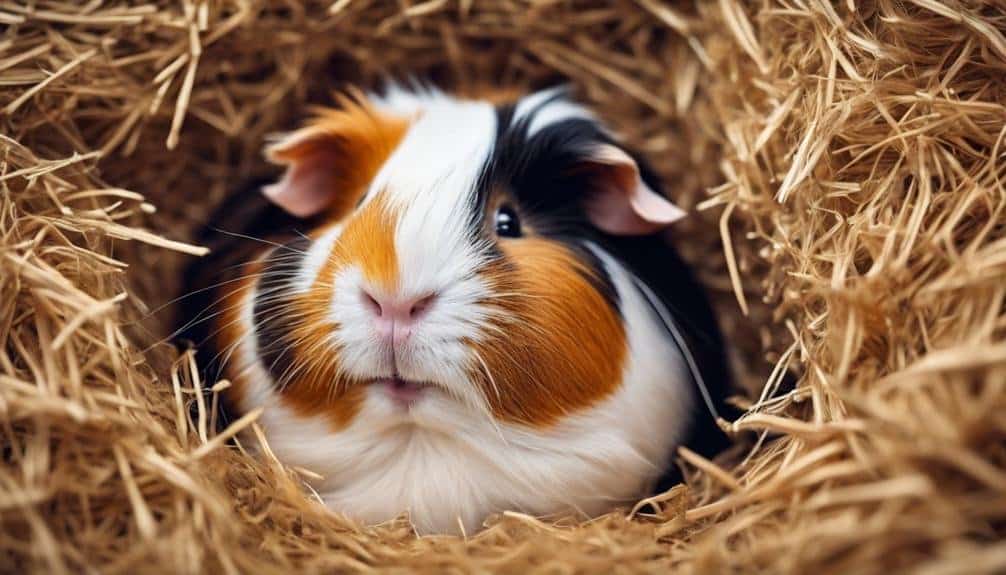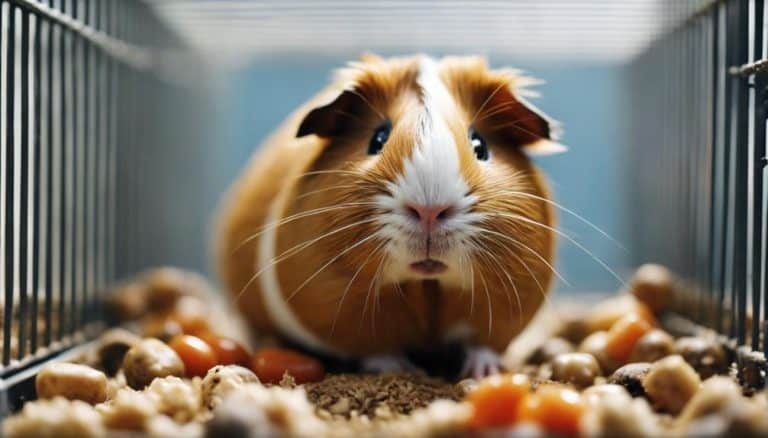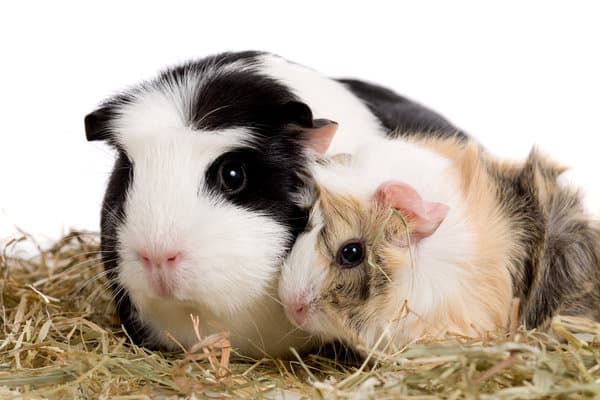How Do Guinea Pigs Sleep Comfortably?
As guinea pig owners, we often wonder: how do these tiny creatures find their slumber sanctuary? Understanding the intricacies of how guinea pigs sleep comfortably is key to ensuring their well-being.
From their unique power nap habits to the ideal sleeping positions, there’s more to discover about these adorable creatures’ nighttime routines.
Let’s explore the secrets to helping our guinea pigs rest peacefully and wake up happy and refreshed.
Typical Sleep Patterns of Guinea Pigs
Guinea pigs exhibit distinctive sleep patterns characterized by short power naps totaling approximately 4 to 6 hours per day. Unlike humans who’ve consolidated sleep, guinea pigs take quick naps throughout the day and night. Being crepuscular animals, they display an active nature during dawn and dusk, influenced by their instincts as prey animals. These quick naps help them remain vigilant to potential threats in their environment, showcasing their adaptive survival mechanisms.
Due to their nocturnal tendencies, guinea pigs show increased activity during low-light periods, making their sleep patterns unique compared to diurnal animals. The fragmented sleep schedule allows them to rest intermittently while staying alert to their surroundings. This behavior aligns with their evolutionary history as prey animals, where staying vigilant is crucial for survival. Understanding these sleep habits is vital for providing a conducive environment for guinea pigs to thrive in captivity.
Ideal Sleeping Positions for Guinea Pigs
When considering the ideal sleeping positions for guinea pigs, it’s essential to provide them with options that promote comfort and security. Guinea pigs sleep comfortably in a curled-up position to conserve body heat and feel secure. Here are some ideal sleeping positions for guinea pigs:
- Curled-up Position: This position helps guinea pigs conserve body heat and provides a sense of security.
- Head on Paws: Some guinea pigs may rest their heads on their paws or tuck them under their bodies while sleeping, which can be comforting.
- Corner or Wall: Sleeping in a corner or against a wall can offer added support and a feeling of safety.
- Cozy Hideout: Leaning against a cozy hideout or tunnel can provide guinea pigs with a secure sleeping environment.
- Soft Bedding: Providing soft bedding like fleece or hay can help guinea pigs find a comfortable sleeping position and enhance their overall sleep experience.
Ensuring Comfortable Bedding for Guinea Pigs

To ensure optimal comfort for guinea pigs, selecting appropriate bedding is crucial to promote their well-being and quality of sleep. Fleece bedding is recommended for guinea pigs as it’s eco-friendly and comfortable for them to rest on.
Providing hay for guinea pigs to nibble on and burrow into while sleeping can enhance their comfort levels. Regular spot checks and weekly cleaning of bedding help maintain a clean and comfortable sleeping environment for guinea pigs.
These furry creatures prefer sleeping in dark, sheltered spots, so offering hiding places such as tunnels or nest boxes can promote better sleep comfort. Monitoring the temperature is vital, ensuring it stays between 17-20°C to help guinea pigs sleep comfortably and avoid potential health issues.
Tips for Improving Guinea Pig Sleep Quality
Implementing cozy hiding spots, such as tunnels, wooden houses, or cardboard boxes, can significantly enhance the sleep quality of guinea pigs. To improve the sleep quality of your guinea pigs, consider the following tips:
- Use Fleece Bedding: Opt for fleece bedding to provide a soft and comfortable surface for your guinea pigs to rest on. Fleece is also eco-friendly and easy to clean.
- Ensure Proper Ventilation: Maintain good airflow in the sleeping area to keep it fresh and prevent any potential health issues for your guinea pigs.
- Establish a Sleep Routine: Create a consistent sleep routine to help your guinea pigs feel secure and relaxed during their rest periods.
- Allow Undisturbed Rest: Avoid disturbances during their nap time to ensure that your guinea pigs can fully relax and rejuvenate.
- Minimize Disturbances: Keep noise levels low and disturbances to a minimum to promote a peaceful sleeping environment for your guinea pigs.
Addressing Common Sleep Issues in Guinea Pigs

In ensuring the optimal sleep quality for guinea pigs, it’s essential to address common sleep issues that may impact their rest and well-being. Guinea pigs are known to have unique sleep patterns, sometimes sleeping with their eyes open, which can be mistaken for wakefulness.
To promote better sleep, providing cozy bedding such as fleece or hay for burrowing is crucial. Creating a quiet environment free from disturbances helps guinea pigs achieve uninterrupted rest. Offering hiding spots like tunnels or shelters in their cage allows them to retreat for naps comfortably.
Establishing a regular sleep schedule through consistent feeding and playtime routines can help guinea pigs feel secure while resting. It’s important to monitor them for any signs of discomfort or changes in sleeping patterns, like restlessness, to promptly address sleep issues.
Conclusion
In conclusion, understanding the unique sleep patterns and habits of guinea pigs is essential for ensuring their comfort and well-being. By providing a dark, secure sleeping environment, comfortable bedding, and a consistent routine, you can help your guinea pig sleep comfortably.
Addressing any common sleep issues promptly and implementing tips to improve sleep quality will contribute to a happy and healthy pet. Remember, a well-rested guinea pig is a happy guinea pig.







